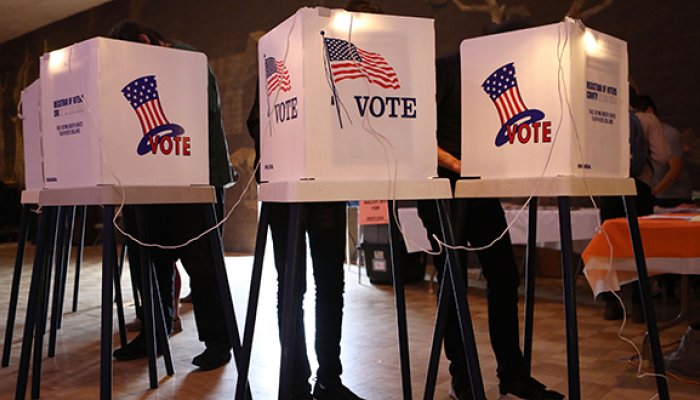Most Americans have uneventful election days. They go to their polling place, announce themselves to the poll worker, cast their ballot, get their sticker, and leave. But between long lines, machine failures, registration issues, efforts to suppress the vote, and the threat of a cyberattack, there’s always the chance that voters will face hurdles. Don’t despair or be deterred. There are some simple steps you can take before and on election day to increase the likelihood of being able to cast a vote that’s counted.
Check your registration status and polling location before voting.
Lots of things can happen between election cycles — politicians redraw boundary lines, election workers cull their voter rolls, and polling places get consolidated. If you check your registration status and where to vote before going to the polls, you can pre-identify problems and have more time to fix them. Many voters can get the information they need online from their state or local election office websites.
Know the rules before you get to the polls.
States have different policies and procedures governing voting and elections. Voter ID laws vary, polling place hours vary, eligibility to vote varies, who is allowed in the polling place varies, etc. If you know your state’s policies and practices, you are in a good position to navigate any hiccups and to protect yourself in the event that a poll worker needs brushing up on the law. A big rule to know is whether your state allows you to register and vote on the same day. If it does, and you find yourself not on the pollbook, you have a pathway to a ballot that not everyone is lucky enough to have.
Plan as best you can to go to the polls outside of peak hours.
Most people find waiting in line to be a big drag. Long lines can be caused by a number of things, including polling places opening late, too few poll workers or working voting machines, or an administrative glitch delaying the processing of voters. If your polling place opens when it should, then being there right when it opens (some states as early as 6 a.m.) shouldn’t be too congested. The periods between late morning and lunch, and between lunch and the end of the work day also are good times.
Politely ask for answers.
Election workers have a tough job to do, and like everyone, they vary in skill, training, and experience. Some poll workers will have a customer service mentality, and others won’t. Some will know the law, and others won’t. If you have brushed up on your rules, and a poll worker is telling you something that isn’t right, politely ask for more information, then escalate to the person higher in the chain of command at the site, and then ask them to contact the election office if you are not getting the help you need. If you can show poll workers that the county or state official website says something different than what they are telling you, they often will get themselves help. Being correct, along with being polite and firm, will go a long way to a reasonable resolution.
Pay attention to your voting machine.
Many of the country’s voting machines are older than the flip phone your dad has in his junk drawer. Their parts and calibration wear out. And we also could do more to guard them against hackers. If you see something that looks glitchy, suspicious, or downright wrong (for example, the computer screen showing a different candidate than the one you selected), alert a poll worker. If your choices are also printed on a paper trail or ballot, examine it. Tell a poll worker if it is wrong.
Enlist 866-OUR-VOTE.
866-OUR-VOTE is a nationwide, free, hotline staffed by trained legal volunteers to help you deal with election day challenges. If you can’t resolve the issue, call 866-OUR-VOTE to see if there are other steps that can be taken. If you are able to resolve your issue, congrats! Call 866-OUR-VOTE anyway. Your call is a data point that voting rights advocates can use to try and address the problem you experienced on a more systematic basis after election day. Let folks who prefer a language other than English know that they can get help, too: Spanish: 888-VE-Y-VOTA; Arabic: 844-YALLA-US; Asian & Pacific languages: 888-API-VOTE; American Sign Language video: 301–818-VOTE; Text “OUR VOTE” to 97779.
Do not leave without casting a provisional ballot, and make them tell you how to check to see if it got counted.
Some percentage of persons (hopefully, a small one) may receive the accurate news that their only recourse is to cast a provisional ballot. Provisional ballots (the name may be different in other states — for example, in New York, they are called affidavit ballots) are ballots that are counted after some conditions are established. The conditions for counting your ballot will vary according to state law and the problem you experienced. For example, the condition may be that an election worker examines your situation and decides that you should have never been purged from the rolls. Or, the condition may be that you present a different kind of documentary identification to your local canvassing board within a certain period of time. Whatever the situation is, and whatever the reason is, do not walk away without casting a provisional ballot. When there is official paperwork demonstrating that voters were having trouble, legislators and advocates can make changes. And, some places use your provisional ballot to register you to vote next year if it turns out you were eligible to vote but not registered in time. After casting your provisional ballot, demand that the poll worker give you the information you need to find out if your provisional ballot will be counted (in many places, it is a piece of paper with a phone number to call). Many polling locations are terrible about giving out that information.
Remember, your right to vote is fundamental.
If this election is like others, there will be some improprieties that will be unfortunately insurmountable for some Americans. But, some of the improprieties will be just hassles and headaches. All Americans should remember that our right to vote is precious and fundamental. It facilitates all of our other rights. Americans have literally died for this right. Do not let craven politicians, hapless bureaucrats, polling place bullies, disenchanted peers, or misinformed citizens deter you from voting. There are people that want to help you and will help you. Vote, vote, vote.
(Image: Mario Tama/Getty)




